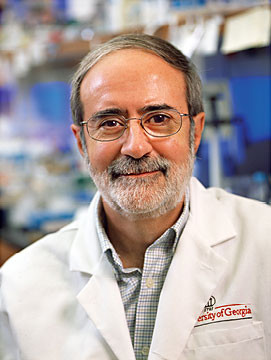Roberto Docampo, M.D., Ph.D.
Tropical and Emerging Global Diseases and Cellular Biology
The University of Georgia
Recruited: 2005
Every year, thousands of people in sub-Saharan Africa are infected by a deadly parasitic disease called sleeping sickness. The parasite, called Trypanoma brucei, is spread through the bite of the tsetse fly, and the only available drug treatments come with severe side effects — occasionally even death.
Roberto Docampo has been making progress in developing new therapies to treat sleeping sickness and other parasitic diseases. His goal: develop a type of chemotherapy that attacks the parasite without harming its human host.
To do this, Docampo and his colleagues must pinpoint a chemical process that works at the cellular level to keep T. brucei alive but is not replicated in human cells – and thus could be halted without hurting the human patient's health.
Their research has led to discovery of a previously unknown organelle, a kind of tiny biological machine that carries out a specific task within a cell. Because the new organelle is acidic and contains a lot of calcium, Docampo and his lab named it the “acidocalcisome.”
The acidocalcisome is necessary for T. brucei's survival, Docampo's team discovered. It contains a receptor that regulates the release of calcium to control T. brucei’s cell functions, allowing the parasite to grow and replicate.
A test using mice confirmed their finding. The researchers produced a genetically modified strain of the parasite, only without that key receptor for calcium found in the acidocalcisome; the mice exposed to this version of the parasite remained healthy.
Now that they’ve identified a potential cellular process for disruption, Docampo and his colleagues are searching for effective ways to target it with drugs.
So far, Docampo has found that bisphosphonates, a type of drug that’s also used in the treatment of osteoporosis, are showing promising results as a treatment for parasitic infections, too.
Research
As acidocalcisomes share traits with the “dense granules” of human platelets, Roberto Docampo’s research has also helped reveal interesting new information about human blood clotting. He found that human platelets' dense granules possess a high concentration of polyphosphates; after thrombin stimulation, this polyphosphate is released, and this plays a role in coagulation and fibrinolysis (breaking down of blood clots). This finding could lead to new treatments to stop bleeding.
Results from Docampo’s lab include:
- Discovery that Trypanosoma cruzi (which causes Chagas disease) is susceptible to antifungal azole compounds; azole compounds are currently under clinical trials for Chagas disease
- Discovery of the trypanosome mitochondrial calcium uniporter, and its role in growth and pathogenesis of T. brucei
- Identifying the acidocalcisome, as the only organelle present from bacteria to human cells
- Discovery of the role of polyphosphate in blood coagulation and inflammation
- Exploration of the role of the contractile vacuole complex in T. cruzi
Straight from the Scholar
Roberto Docampo chose Georgia because of “the support that Georgia, through the Georgia Research Alliance, provides to research and education; the possibility of interaction with an outstanding group of scientists at the Center for Tropical and Emerging Global Diseases and the UGA Department of Cellular Biology; and the resources provided by GRA to support our research.”

